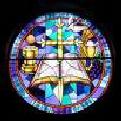 While reading over some things in preparation for the upcoming discussion of worship (next week in St. Louis), it occurs to me that we often speak as if the means of grace were merely delivery vehicles and not the Gospel itself. It reminds me of those who described the role of the Blessed Virgin in the incarnation of our Lord. They described her role as a pipe through which Christ was born but from which He took nothing. This was a false and heretical view (obviously contrary to Scripture). He was incarnate from the Virgin Mary -- He did not simply pass through her womb but took from her the flesh and blood of His humanity.
While reading over some things in preparation for the upcoming discussion of worship (next week in St. Louis), it occurs to me that we often speak as if the means of grace were merely delivery vehicles and not the Gospel itself. It reminds me of those who described the role of the Blessed Virgin in the incarnation of our Lord. They described her role as a pipe through which Christ was born but from which He took nothing. This was a false and heretical view (obviously contrary to Scripture). He was incarnate from the Virgin Mary -- He did not simply pass through her womb but took from her the flesh and blood of His humanity.As Lutherans, our sacramental theology is rooted in the Incarnation. The union of earthly element and heavenly grace is modeled after the union of earthly flesh and blood with the Divine Nature that is the Incarnation. Neither element destroying the other but both existing together as one, whole and complete. So, for example, it is not that the Body of Christ is attached to the bread but the two are not connected. The Body of Christ exists in and with and under the bread so that we speak of that bread as the Body of Christ -- not as if the earthly element were merely a pipe through which the Body of Christ passes.
Perhaps a more modern day image is that of an email attachment and its relationship to the email itself. The Blessed Virgin is not like the email to which God has attached something -- separate and distinct from the Virgin, drawing nothing from her and her flesh and blood but only sent with her and through her. In the same way, the bread is not the email to which God has attached His Body but the two are separate and distinct -- only only the agent of the sending and the other what is being sent.
The means of grace are not the vehicles of the Gospel as if they were not the same -- they are the same. The means of grace IS the Gospel. The Gospel is the Word (both written and spoken and directed, as in absolution) that forgives sin, restores the lost, and imparts new life. The Gospel is the water that cleanses from sin, incorporates into the death and resurrection of Christ, and imparts the new identity of the Child of God. The Gospel is the bread and wine (Christ's Body and Blood) that forgive sin, nourish our faith, allow us to glimpse the heavenly meal, and seal us as the family of God.
It seems that our great temptation is to make the Gospel into a principle instead of recognizing that the Gospel is Christ, the Gospel is where Christ has put it (that is, put Himself, in Word and Sacrament, the means of grace), and the Gospel does what Christ intends (what Christ does). If we can locate the Gospel outside the means of grace, if we can define the means of grace merely as delivery system, then we can make them less central to the life and identity of the Church and each individual Christian. This, I believe, is the goal of those who make this distinction (sort of like those who would distinguish style and substance as if they were but loosely connected and one did not flow from the other...).
These are just some rudimentary thoughts I had this morning... I have not fully developed this and will probably spend some more time on it... In the mean time it may give you something to think about, too...
3 comments:
I like the image of the e-mail attachment. It is not like an attachment - it is the text of the e-mail itself -- you only get the one because it comes through and is from the other. It works really, really well.
The Lutheran Confessions seem to agree with you: Large Catechism IV.26-37 (Concordia pp. 426-7).
At least one interesting question arises from this, though: if the means of grace are the Gospel, what does it mean for them to be called 'signs'? Signs of God's divine favour? Or signs of the Gospel? There is a well-established Augustinian-Calvinist take on this, as is well known.
An excellent post, Fr. Peters. Please keep hitting theological home runs. I even linked your post to my blog. Hope you don't mind.
Post a Comment